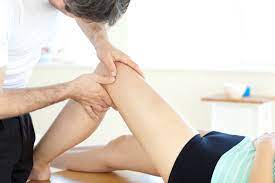Physiotherapy be helpful in knee- pain.

Physiotherapy can be highly beneficial in the management of knee pain.
Pain reduction: Physiotherapist in Janakpuri There Physiotherapists employ various techniques to alleviate knee pain, such as manual therapy, heat or cold therapy, ultrasound, and electrical stimulation. These modalities can help reduce inflammation, promote tissue healing, and alleviate discomfort.
Strengthening exercises: Weakness in the muscles surrounding the knee can contribute to pain and instability. Physiotherapist of Dwarka Prefer specific exercises to strengthen the quadriceps, hamstrings, hip muscles, and core. Strengthening these muscles helps to provide better support to the knee joint, reduce stress on the knee, and enhance overall function.
Range of motion exercises: Knee pain can lead to stiffness and limited mobility. Physiotherapists utilize specific stretching and range of motion exercises to improve flexibility and restore the full range of motion in the knee joint.
Balance and proprioception training: Impaired balance and proprioception (the body’s sense of its position in space) can increase the risk of falls and further knee injuries. Physiotherapists incorporate exercises that challenge balance and improve proprioception, helping to enhance stability and reduce the likelihood of future knee problems.
Gait retraining: Abnormal walking patterns can contribute to knee pain. Physiotherapists analyze and correct gait abnormalities by providing guidance on proper walking and running techniques. This helps to distribute forces evenly through the lower limbs, reducing stress on the knee joint.
Assistive devices and braces: Physiotherapists can recommend and provide appropriate assistive devices, such as crutches or canes, to offload the knee joint during the recovery phase. They may also suggest knee braces or orthotics to provide additional support and stability.
Education and self-management: Physiotherapists play a crucial role in educating patients about their knee condition, helping them understand the underlying causes of their pain and how to manage it effectively. They may provide advice on activity modification, ergonomics, and lifestyle changes to prevent further knee problems.